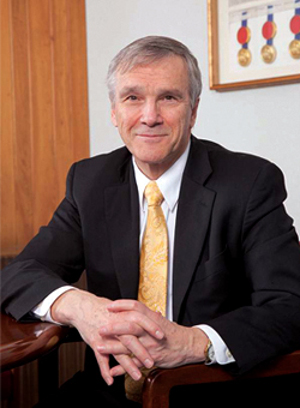
The battle to cash in on international students has taken a new twist as an Ontario public college has agreed to grant diplomas to students who study at private Sprott Shaw Colleges in British Columbia.
The public-private partnership announced last month gives Sprott Shaw the right to use the curriculum from two business programs at the Conestoga College Institute of Technology and Advanced Learning.
Students will get credentials from both schools, even though they take no classes at the public college, and the two schools will split the revenue.
International students, who pay much higher tuition, have become an important source of new revenue for cash-strapped post-secondary institutions as governments have funded a shrinking share of their operations. Between 2008 and 2014 the number of international students in Canada jumped by 83 per cent.
Conestoga president John Tibbits said that in a time of government austerity, the partnership was a business decision that gives the college access to a new market -- international students already studying in B.C.
"Every international student that comes in, whatever tuition they pay, we get that right away," he said. International students enrolled at the college have provided revenue to add programs and resources. Sprott Shaw has "quite a recruiting network" and the deal will raise the college's profile in Asia, he added.
As many as 1,500 international students at Sprott Shaw's 13 B.C. campuses could start the programs this spring paying $24,000 each, representing up to $36 million in revenue. The split between Conestoga and Sprott Shaw is still to be negotiated.
Faculty fear lower quality education
The public-private partnership is a concern for faculty unions in both B.C. and Ontario, who see it as another example of cash-strapped public institutions trying to survive any way they can, with students paying the price.
George Davison, president of the Federation of Post-Secondary Educators of B.C., said in the 1980s and 1990s government funding 70 to 80 per cent of post-secondary institutions' budgets. "At many of our institutions now, it's in the 40- to 50-per cent range," he said.
"Back 25 years ago, students paid about 10 per cent of the total cost of education,¨ Davison said. Now it's in the 30- to 40-per-cent range, sometimes almost 50 per cent, he said.
The situation is similar in Ontario, where tuition at public colleges climbed to 33 per cent of overall revenue in 2013 from nine per cent in 1988-89. During that same period, Conestoga's per-student government funding dropped from $6,000 to $4,200.
Conestoga's own faculty have been largely kept in the dark about the agreement. Lana-Lee Hardacre, president of the Ontario Public Service Employees Union local representing the college's faculty, learned about the partnership from the press release announcing the deal.
"Faculty are feeling very concerned about it now because these are courses that they created or they may have taught them for a number of years, and now they're going outside our college," said Hardacre.
The plan is that Sprott Shaw will work with Conestoga to hire teachers meeting the public college's standards.
But Hardacre said it is not clear whether Sprott Shaw will hire part-time or contract faculty who will have less time to engage with students than tenured faculty at Conestoga. She said she doesn't know if Sprott Shaw's faculty will have preparation or course evaluation time as college faculty do.
Sprott Shaw is already talking about offering the programs to domestic students next year and expanding to deliver Conestoga's tourism and hospitality programs. The college offers four-year degrees, diplomas, certificate, and apprenticeship training
But Conestoga president Tibbits says it too early to speculate about the partnership's future: "I think we need to get these up and running, evaluate them, see how the students respond, and then start these discussions."
Best of both worlds for students, says Sprott Shaw president
Sprott Shaw president Patrick Dang said the deal is good for international students. They will have the benefits of the private college's small class sizes and relationships with employers for co-op and internship opportunities, and the high academic standards and online resources of Conestoga, he said.
"It's always been a desire for me to be able to demonstrate that the... private system can also meet and set the same standards," he said.
Having Conestoga's international students at Sprott Shaw will open more domestic student seats at the public college, Dang added.
Tibbits said there is no harm in allowing private colleges to access Conestoga's publicly funded online resources. "It's not a zero sum game. The online resources, if they're using them, it doesn't mean someone else can't."
Both Dang and Tibbits noted students who complete the diploma programs -- one takes 16 months, the other a year -- could then go to Conestoga to further their education and earn a degree.
When asked about the partnership, Advanced Education Minister Andrew Wilkinson responded via email that his government will monitor the partnership. "Our government encourages efforts that add to the learning experience of students, whether international or domestic," he wrote.
Conestoga's international student numbers have risen 60 to 70 per cent in less than a decade, Tibbitts said, allowing the college to provide more programs, particularly in science, technology, engineering and math. That has increased opportunity for all students, he added.
Conestoga has developed about 20 programs that wouldn't have been sustainable with domestic students alone, almost half of them in engineering, he said. Domestic student interest often isn't enough to meet minimum enrollment for programs like embedded systems management, he said. ¨If we open it up to people from India, etc., we can actually offer it." ![]()
Read more: Education















Tyee Commenting Guidelines
Comments that violate guidelines risk being deleted, and violations may result in a temporary or permanent user ban. Maintain the spirit of good conversation to stay in the discussion.
*Please note The Tyee is not a forum for spreading misinformation about COVID-19, denying its existence or minimizing its risk to public health.
Do:
Do not: